Just finished Gabriel García Márquez's first novel in ten years, Memorias de Mis Putas Tristes (see sidebar), or, in the English version, Memories of My Melancholy Whores. GGM won the Nobel Prize for Literature in '82, largely due to his short stories and Cien Años de Soledad, a circular, confusing, but breathtaking novel about love, life, death, magic realism--in all their earthiness.
Memorias is not so profound a work as it is sadly quixotic--the main character, a 90-year old, retired columnist who's spent his life going from brothel to brothel for sexual encounters, decides to celebrate his 90th birthday by spending a night with an adolescent virgin. He spends that night, however, merely looking at the nude, sleeping girl, entranced by her pure beauty. The rest of the book details his repeated requests to spend night after night--an entire year--looking at the one he considers the only girl he's ever loved. Yet it's clear he merely loves the idea of her--at one point she briefly wakes and says something, and he decides immediately that he likes her better asleep--and is determined to remain ignorant even of her real name: his ideal woman--he calls her Delgadina for lack of an actual name--is really his Dulcinea. Sadder, pues, because, unlike Quijote, it is clear that our unnamed protagonist knowingly and overtly chooses to favor his idealism over that which is in front of him, yet still reminiscent of the Don, as his choosing to escape the imposition of his age (imposed by all around him, from co-workers to total strangers) through finding youthful feelings he'd never before experienced and tenaciously clinging to this surreal fantasy, states that one truly can be only as old as one feels.
Not his best work--the description is somewhat drier than Cien Años--but the earthy theme of falling for the young, virginal (and exploited) purity is faithfully visited yet again. An overall enjoyable read.
Saturday, January 28, 2006
Thursday, January 19, 2006
Finally...More Building Pics....
First things first...links to the previous phases of the building program:
Phase 1
Phase 2
Phase 3
Phase 4
Phase 5
Phase 6
Phase 7
These are actually not representative of the most recent changes (I keep forgetting to bring the camera with me to church!), so those will be forthcoming (floors tiled, etc.); this is mostly of the blessing done by the Archbishop on his recent (12/4/o5) trip to our parish.

The first thing that's noticeable is the big glass doors at the main entrance! (That's Nick, the choir director and son of Fr. Basil, giving me his always-pleasant look...;-))

Once inside there's the drywalled entrance from the narthex into the nave (with glass panel above)...
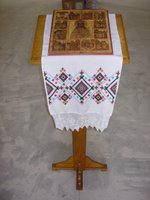
Upon entering the nave we were greeted with the icon of our parish's heavenly patroness, St. Barbara the Holy Martyr.

Table with cross and holy water for the bishop's blessing of the building, with icons of the Lord and Theotokos on the ambon.
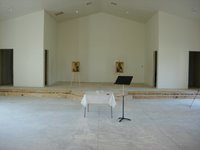 A wide shot of the ambon w/icons, and the table.
A wide shot of the ambon w/icons, and the table.
 The Archbishop and Fr. Basil prepare for the blessing.
The Archbishop and Fr. Basil prepare for the blessing.
 Protodeacon Patrick bows to Vladyka to begin the blessing.
Protodeacon Patrick bows to Vladyka to begin the blessing.
 His Eminence reads the gospel.
His Eminence reads the gospel.
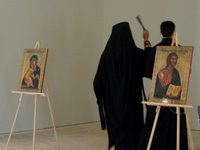 The Archbishop proceeds around the church, sprinkling it with holy water, while the choir sings, "When Thou, O Lord, wast baptized in the Jordan, the worship of the Trinity was made manifest! For the voice of the Father bore witness to Thee, and called Thee His beloved Son! And the Spirit in the form of a dove confirmed the truthfulness of His word. O Christ our God, Who hast revealed Thyself and hast enlightened the world, glory to Thee!"
The Archbishop proceeds around the church, sprinkling it with holy water, while the choir sings, "When Thou, O Lord, wast baptized in the Jordan, the worship of the Trinity was made manifest! For the voice of the Father bore witness to Thee, and called Thee His beloved Son! And the Spirit in the form of a dove confirmed the truthfulness of His word. O Christ our God, Who hast revealed Thyself and hast enlightened the world, glory to Thee!"
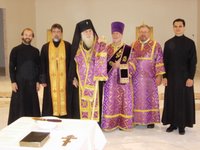 The clergy lined up for a photo op after the blessing.
The clergy lined up for a photo op after the blessing.
Phase 1
Phase 2
Phase 3
Phase 4
Phase 5
Phase 6
Phase 7
These are actually not representative of the most recent changes (I keep forgetting to bring the camera with me to church!), so those will be forthcoming (floors tiled, etc.); this is mostly of the blessing done by the Archbishop on his recent (12/4/o5) trip to our parish.

The first thing that's noticeable is the big glass doors at the main entrance! (That's Nick, the choir director and son of Fr. Basil, giving me his always-pleasant look...;-))

Once inside there's the drywalled entrance from the narthex into the nave (with glass panel above)...

Upon entering the nave we were greeted with the icon of our parish's heavenly patroness, St. Barbara the Holy Martyr.

Table with cross and holy water for the bishop's blessing of the building, with icons of the Lord and Theotokos on the ambon.
 A wide shot of the ambon w/icons, and the table.
A wide shot of the ambon w/icons, and the table. The Archbishop and Fr. Basil prepare for the blessing.
The Archbishop and Fr. Basil prepare for the blessing. Protodeacon Patrick bows to Vladyka to begin the blessing.
Protodeacon Patrick bows to Vladyka to begin the blessing. His Eminence reads the gospel.
His Eminence reads the gospel. The Archbishop proceeds around the church, sprinkling it with holy water, while the choir sings, "When Thou, O Lord, wast baptized in the Jordan, the worship of the Trinity was made manifest! For the voice of the Father bore witness to Thee, and called Thee His beloved Son! And the Spirit in the form of a dove confirmed the truthfulness of His word. O Christ our God, Who hast revealed Thyself and hast enlightened the world, glory to Thee!"
The Archbishop proceeds around the church, sprinkling it with holy water, while the choir sings, "When Thou, O Lord, wast baptized in the Jordan, the worship of the Trinity was made manifest! For the voice of the Father bore witness to Thee, and called Thee His beloved Son! And the Spirit in the form of a dove confirmed the truthfulness of His word. O Christ our God, Who hast revealed Thyself and hast enlightened the world, glory to Thee!" The clergy lined up for a photo op after the blessing.
The clergy lined up for a photo op after the blessing.
You know what's not fair?
 So Audra and I are with Hope last night, in her room, doing our shortened rule for Evening Prayers with her, and I'm trying to focus on the Trisagion Prayers or whatever I happened to be on, and I notice a little snickering coming from Audra, who's holding Hope. I look over and see, basically, what you're seeing to the right here. She not only has this onery grin on her face, but has reached over and grabbed my shirt sleeve and, with all the eloquence she can muster, declares the following:
So Audra and I are with Hope last night, in her room, doing our shortened rule for Evening Prayers with her, and I'm trying to focus on the Trisagion Prayers or whatever I happened to be on, and I notice a little snickering coming from Audra, who's holding Hope. I look over and see, basically, what you're seeing to the right here. She not only has this onery grin on her face, but has reached over and grabbed my shirt sleeve and, with all the eloquence she can muster, declares the following:"Aaaaah? AAAAAAAah! Nnn-GUH!"
We, of course, had to fight to keep from giggling through the benediction, but I, for one, would like to know exactly how one is supposed to clear one's mind and focus on the All-Holy Trinity when this little stinker is up to stuff like this. Makes me realize why bishops and monks are childless...
What's With That Middle Flag?
EDIT: Since the writing of this post, I have since come to hold a different opinion than the one expressed in this post. While it is still true that the Civil War was about many different issues, none of these issues would have been issues sufficient to start a war in the first place had chattel slavery not been in place.
Yes, it concerned the right to secede. Yes, it concerned the issue of states' sovereignty vs. federal centralization. But, in 1860, what it meant to be concerned about those issues was that you desired to secede and exercise states' rights in order to keep other human beings in bondage. Thus, while the issues of states' rights and secession continue to be viable political issues in some (small) corners of the country today, one should not and must not cite the CSA as some sort of heroic precedent regarding these issues; such a citation would and does only lead to an implicit, if not explicit, excusing of chattel slavery, which is now exclusively a moral issue in today's society, not a primarily economic one, as it was in that of the 1860s. Such a position is inexcusable in today's world.
Nevertheless, I am keeping the words up for posterity; I do hope that those who find resonance with what I wrote below would stop, reflect, and reconsider what waving the Stars and Bars, however culturally one might feel about it, says today. I continue to recognize that those who fought for the South (my paternal great-great-grandfathers included) did so mostly in a short-sighted attempt to defend their parcel of land and their immediate families, which they were told were being threatened by "Damn Yankees." Many of them did not own slaves (mine did at some point, I believe), and many willingly manumitted them once they saw that they could fight like the men that they were and are. Nevertheless, in our contemporary dialogue on democratic structure, let us allow the past to remain in the past, in a context that is wholly its own, and let us draw from it those lessons we can and should, without the unfortunate wholesale adoption of its truly lost cause, as many misguidedly do today. May God truly bless and save the South, and the North, and all mankind. ~ Fr. David Wooten, Sept. 7, 2012.
Some of you may be wondering about the middle flag of the three beneath my profile on the blog's main page, having easily recognized the American flag and (perhaps not as easily recognized) the Texas flag on the right.
The flag (seen here to the right) is the first national flag of the Confederate States of America, or the South ("Dixie") in the War Between the States. It's here on this blog for more than one reason.
First of all, it's here because I'm a person who has lived his whole life in OK and TX (not considered Dixie by some, but still) and who sympathizes with the secession of the southern states from the USA in 1861. In spite of the horrible stain of slavery--which is undeniably a reason, but not the only reason, WHY THE SOUTH SECEDED-- the fact of the matter is that the North (which still held slaves before, during, and after the War) had absolutely no right to force a group of states to remain in a union whose Constitution it no longer had any desire to support. The North, then, left us no other alternative to dealing with its illegal and unconstitutional actions against us in many areas other than (and, alas including) slavery. I simply seek to remember and honor the brave men and women who supported and died in the ultimately futile struggle to preserve the actual ideals of the Bill of Rights, Declaration of Independence, and the Constitution itself. I think our country would do well to listen to all the other things the South was trying to say about how to run this country when she left the union.
the fact of the matter is that the North (which still held slaves before, during, and after the War) had absolutely no right to force a group of states to remain in a union whose Constitution it no longer had any desire to support. The North, then, left us no other alternative to dealing with its illegal and unconstitutional actions against us in many areas other than (and, alas including) slavery. I simply seek to remember and honor the brave men and women who supported and died in the ultimately futile struggle to preserve the actual ideals of the Bill of Rights, Declaration of Independence, and the Constitution itself. I think our country would do well to listen to all the other things the South was trying to say about how to run this country when she left the union.
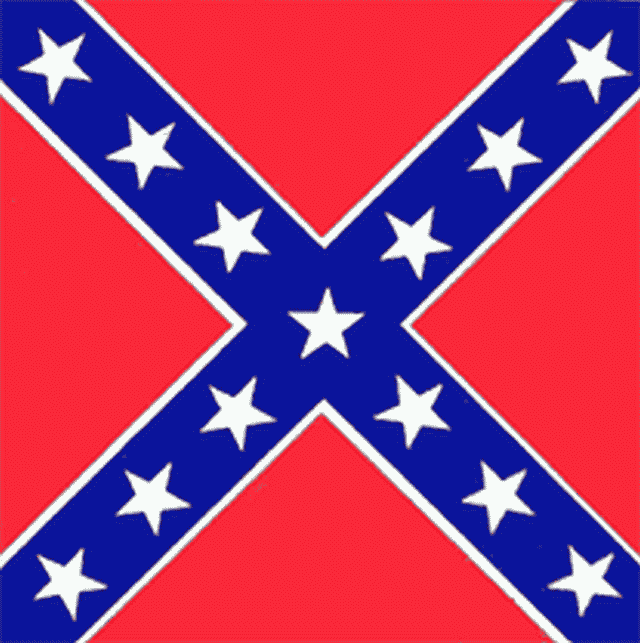
Secondly, the "Stars and Bars" (the flag at the top of the post, under which is the "Bonnie Blue Flag") is much less controversial than the so-called "Rebel Flag," or, Confederate Battle Flag/Naval Jack, pictured here, and so the former flag is displayed instead of the latter. I have no problem myself with this symbol; fact is, this flag doesn't represent slavery nor does it represent KKK sympathies any more than the American flag. In fact, the American flag (which is the official flag of the KKK, by the way) has an even longer association with both slave trade and the Klan than the Confederate Battle Flag). However, the meaning of the Star Spangled Banner has changed--we've acknowledged the presence of genocide and oppression in its history and have sought to make amends while continuing to fly it for different reasons in this day and age, in spite of the fact that hate groups like the Klan might still want to use it for their ignorant purposes. For us to say that the American flag can experience this unquestioned redemption of its meaning, while groups like the Sons of Confederate Veterans--which is about as close to an official voice of the now-defunct Confederacy as you can get these days--cannot be allowed by popular culture to acknowledge the sins of their fathers, while at the same time honoring and remembering what was and is good and right about these symbols and struggles, seems to me to be a double standard that has no basis in history or fact, but rather media hype and ignorance of that fateful time in our nation's (nations' ?) history.
For us to say that the American flag can experience this unquestioned redemption of its meaning, while groups like the Sons of Confederate Veterans--which is about as close to an official voice of the now-defunct Confederacy as you can get these days--cannot be allowed by popular culture to acknowledge the sins of their fathers, while at the same time honoring and remembering what was and is good and right about these symbols and struggles, seems to me to be a double standard that has no basis in history or fact, but rather media hype and ignorance of that fateful time in our nation's (nations' ?) history.
Nevertheless--for the sake of charity and others' feelings, I've stuck with the more "neutral" flag so that people aren't turned off immediately by a symbol that, admittedly and unnecessarily, still angers many.

Picked the birthday of this guy to the right--Gen. Robert E. Lee, the commander of the Confederate armies who, interestingly enough, freed every slave that was ever given to him (and that was before the war), while Gen. Grant of the North owned slaves even afterwards--to put this up.
Let's honor all history. Reject that which is evil, cling to that which is good...







(The Confederate National Anthem, "God Save the South")
DEO VINDICE

The flag (seen here to the right) is the first national flag of the Confederate States of America, or the South ("Dixie") in the War Between the States. It's here on this blog for more than one reason.
First of all, it's here because I'm a person who has lived his whole life in OK and TX (not considered Dixie by some, but still) and who sympathizes with the secession of the southern states from the USA in 1861. In spite of the horrible stain of slavery--which is undeniably a reason, but not the only reason, WHY THE SOUTH SECEDED--
 the fact of the matter is that the North (which still held slaves before, during, and after the War) had absolutely no right to force a group of states to remain in a union whose Constitution it no longer had any desire to support. The North, then, left us no other alternative to dealing with its illegal and unconstitutional actions against us in many areas other than (and, alas including) slavery. I simply seek to remember and honor the brave men and women who supported and died in the ultimately futile struggle to preserve the actual ideals of the Bill of Rights, Declaration of Independence, and the Constitution itself. I think our country would do well to listen to all the other things the South was trying to say about how to run this country when she left the union.
the fact of the matter is that the North (which still held slaves before, during, and after the War) had absolutely no right to force a group of states to remain in a union whose Constitution it no longer had any desire to support. The North, then, left us no other alternative to dealing with its illegal and unconstitutional actions against us in many areas other than (and, alas including) slavery. I simply seek to remember and honor the brave men and women who supported and died in the ultimately futile struggle to preserve the actual ideals of the Bill of Rights, Declaration of Independence, and the Constitution itself. I think our country would do well to listen to all the other things the South was trying to say about how to run this country when she left the union.
Secondly, the "Stars and Bars" (the flag at the top of the post, under which is the "Bonnie Blue Flag") is much less controversial than the so-called "Rebel Flag," or, Confederate Battle Flag/Naval Jack, pictured here, and so the former flag is displayed instead of the latter. I have no problem myself with this symbol; fact is, this flag doesn't represent slavery nor does it represent KKK sympathies any more than the American flag. In fact, the American flag (which is the official flag of the KKK, by the way) has an even longer association with both slave trade and the Klan than the Confederate Battle Flag). However, the meaning of the Star Spangled Banner has changed--we've acknowledged the presence of genocide and oppression in its history and have sought to make amends while continuing to fly it for different reasons in this day and age, in spite of the fact that hate groups like the Klan might still want to use it for their ignorant purposes.
 For us to say that the American flag can experience this unquestioned redemption of its meaning, while groups like the Sons of Confederate Veterans--which is about as close to an official voice of the now-defunct Confederacy as you can get these days--cannot be allowed by popular culture to acknowledge the sins of their fathers, while at the same time honoring and remembering what was and is good and right about these symbols and struggles, seems to me to be a double standard that has no basis in history or fact, but rather media hype and ignorance of that fateful time in our nation's (nations' ?) history.
For us to say that the American flag can experience this unquestioned redemption of its meaning, while groups like the Sons of Confederate Veterans--which is about as close to an official voice of the now-defunct Confederacy as you can get these days--cannot be allowed by popular culture to acknowledge the sins of their fathers, while at the same time honoring and remembering what was and is good and right about these symbols and struggles, seems to me to be a double standard that has no basis in history or fact, but rather media hype and ignorance of that fateful time in our nation's (nations' ?) history.Nevertheless--for the sake of charity and others' feelings, I've stuck with the more "neutral" flag so that people aren't turned off immediately by a symbol that, admittedly and unnecessarily, still angers many.

Picked the birthday of this guy to the right--Gen. Robert E. Lee, the commander of the Confederate armies who, interestingly enough, freed every slave that was ever given to him (and that was before the war), while Gen. Grant of the North owned slaves even afterwards--to put this up.
Let's honor all history. Reject that which is evil, cling to that which is good...






DEO VINDICE
Wednesday, January 18, 2006
Liturgical Colors
Normal: Blog header/footer 710,
Body background ccc,
profile-container background 999
Lent: Blog header/footer/prof 8B008B,
Body background DDA0DD
Lazarus: head/foot/prof.: 663300
Body Backgr: CC9966
Holy Week: head/foot/pro 000000
body backgr 202020
Theotokos: head/foot/prof 6495ED
body backgr ADD8E6
Pascha: head/foot/prof FFFAFA, text fff-->000
body backgr DCDCDC
Pentecost: head/foot/prof 347C17
body backgr 99C68E
Body background ccc,
profile-container background 999
Lent: Blog header/footer/prof 8B008B,
Body background DDA0DD
Lazarus: head/foot/prof.: 663300
Body Backgr: CC9966
Holy Week: head/foot/pro 000000
body backgr 202020
Theotokos: head/foot/prof 6495ED
body backgr ADD8E6
Pascha: head/foot/prof FFFAFA, text fff-->000
body backgr DCDCDC
Pentecost: head/foot/prof 347C17
body backgr 99C68E
Wednesday, January 11, 2006
The Psalms of David -- Psalm 23
I had no idea where this was until I found it here a while back; I still get flashbacks of my first Pascha when Fr. George banged on the doors of the church from outside and shouted the proclamation below, answering the question asked from inside by one of the men who (quickly) went about changing the candle holders'/cloths' colors while we sang "Thy Resurrection" outside...
7 Lift up your heads, O you gates!Christ is risen!
And be lifted up, you everlasting doors!
And the King of glory shall come in.
8 Who is this King of glory?
The LORD strong and mighty,
The LORD mighty in battle.
9 Lift up your heads, O you gates!
Lift up, you everlasting doors!
And the King of glory shall come in.
10 Who is this King of glory?
The LORD of hosts,
He is the King of glory.
Sunday, January 08, 2006
New Hope Elizabeth Pics!
Stacy commented on Hope Elizabeth in the last post's comments section just as I was updating said site! Click on "this little one" in my profile, then go to "December and Christmas 05" to see the most recent stuff.
Oh, and Stacy...Vladyka (Abp. +DMITRI) is doing great as always, thanks be to God. How are you acquainted with him?
Oh, and Stacy...Vladyka (Abp. +DMITRI) is doing great as always, thanks be to God. How are you acquainted with him?
Faith as Encounter
Being alums of Oral Roberts University who converted to the Orthodox Christian faith has made my wife and me, along with the many others who've come in with us over a period of about five to ten years, pseudo-celebrities of sorts when visiting other parishes. "Oh, you're one of them!" we seem to hear more often than not. And it's true, it is notable that several students from one of the most well-known protestant/charismatic universities in the world moved from that lifestyle to embrace the ancient faith of the Apostles. Yet, something has been happening lately to some of us that has made me thoughtful. It all started with a conversation on AIM a few weeks ago...
I was talking with one of my fellow ORU converts, who told me quite frankly that he wasn't really attending church anymore, that he wasn't really any kind of a Christian anymore. He named several people from "our group" (we all, of course, bonded well there in Tulsa, going through our similar situations as we were) who felt much the same way, according to him: scattered attendance, general lack of interest in Orthodoxy in particular and Christianity in general. And while this was not, by any means, characteristic of the whole group, the fact that it was more than just a handful bothered me. I began to ask myself why a move to Orthodoxy (or any purposeful move from one confession to another) would, in fact, hinder spiritual growth rather than help it.
Without judging the individuals who converted with me, I'll just speak from my own experience, and from general trends I've noticed. Converting to Orthodoxy from, say, Evangelical Protestantism, as I did, requires that one receive--either through a priest's patient catechism or one's own reading--the equivalent of a couple of courses in Christian Church History and/or the Early Church Fathers if one is to intelligently understand and be able to defend one's move. Things like sacraments--specifically,
What is it, then, that keeps my faith, personally, from going the way of the dusty textbook? Of course, God's grace, for some reason, has been given to me again and again (Why? Anybody's guess), and has initiated, followed and (Lord willing) will complete my journey of faith, as I walk along with Christ. There is, however, one specific characteristic of my faith (as contrasted with "cerebral" adherance) that, I believe, is absolutely necessary for Christians (of any stripe, but particularly those with "much ornamentation" like us Orthodox) to keep in mind in order to continue in a personally meaningful relationship of faith with the Holy Trinity: Faith as Encounter.
For example: Why do we have icons in our churches? Is it merely because St. Theodora decreed that icons were to be used in churches, thereby ending the centuries-long conflict between the iconoclasts and the iconodules (the latter personified by St. John of Damascus) through empirical decree, the commemoration of which on the Church's calendar is the first Sunday of Great Lent? Or is it something more? Is it because God uses windows to meet us? Is it because His holy ones, worship--really worship!--our God with us through their presence in their windows? Or, to compare it another way: Are icons simply "a visible manifestation of the Church's awareness of the Incarnation, of Christ's being the eikon of the invisible God," or are they also a celebration of the fact that the command against making images of the deity has been forever and irrevocably reversed, for we can now know that God is with us, and the fact that we can have His precious image with us, at all times, joyously complete, bears glorious witness to this truth that should transform our lives, make our lives "windows into heaven"--in short, make us into living icons?
This is only one example, but I hope I've been clear in my illustration: we, as Orthodox Christians (and, I would add, especially converts like myself who come from confessions with fewer or no "liturgical accoutrements"), have to be wary of the idolatry of seeing the priest's stole in confession as merely an end in itself, of seeing icons as no more than the proper response to a historical and christological (read: largely academic) dilemma, of seeing the Real Presence and Baptismal Regeneration as only fidelity to apostolic doctrines--instead of seeing all these things as very real keys to our life in and with Christ, who gives us the Holy Spirit, who brings us blameless to the Father. All our "things" and doctrinal stances in Orthodoxy, beautiful and tangible and physical though they are (and must) be, must also "become transparent"--or, rather, be connected with the spiritual reality that is the Kingdom of Heaven--so that we may revel in the grateful knowledge that "of him, and through him, and to him, are all things: to whom be glory for ever. Amen." (Rom. 11:36).
I was talking with one of my fellow ORU converts, who told me quite frankly that he wasn't really attending church anymore, that he wasn't really any kind of a Christian anymore. He named several people from "our group" (we all, of course, bonded well there in Tulsa, going through our similar situations as we were) who felt much the same way, according to him: scattered attendance, general lack of interest in Orthodoxy in particular and Christianity in general. And while this was not, by any means, characteristic of the whole group, the fact that it was more than just a handful bothered me. I began to ask myself why a move to Orthodoxy (or any purposeful move from one confession to another) would, in fact, hinder spiritual growth rather than help it.
Without judging the individuals who converted with me, I'll just speak from my own experience, and from general trends I've noticed. Converting to Orthodoxy from, say, Evangelical Protestantism, as I did, requires that one receive--either through a priest's patient catechism or one's own reading--the equivalent of a couple of courses in Christian Church History and/or the Early Church Fathers if one is to intelligently understand and be able to defend one's move. Things like sacraments--specifically,
- that baptism is not just a motion gone through in obedience but rather the moment where our initial faith is fully kindled and blossoms,
- that confession to an apostolically-decended priest or bishop is also a part of confession of one's sins, that individual confession, while good, is not enough,
- that communion is not just a "memorial meal" of mere bread and wine but the very Body and Blood of Christ,
- that one cannot simply "be called" to start his/her own denomination with varying degrees of agreement with other groups, but that one must be appointed by the abovementioned apostolically-succeeded bishop,
What is it, then, that keeps my faith, personally, from going the way of the dusty textbook? Of course, God's grace, for some reason, has been given to me again and again (Why? Anybody's guess), and has initiated, followed and (Lord willing) will complete my journey of faith, as I walk along with Christ. There is, however, one specific characteristic of my faith (as contrasted with "cerebral" adherance) that, I believe, is absolutely necessary for Christians (of any stripe, but particularly those with "much ornamentation" like us Orthodox) to keep in mind in order to continue in a personally meaningful relationship of faith with the Holy Trinity: Faith as Encounter.
For example: Why do we have icons in our churches? Is it merely because St. Theodora decreed that icons were to be used in churches, thereby ending the centuries-long conflict between the iconoclasts and the iconodules (the latter personified by St. John of Damascus) through empirical decree, the commemoration of which on the Church's calendar is the first Sunday of Great Lent? Or is it something more? Is it because God uses windows to meet us? Is it because His holy ones, worship--really worship!--our God with us through their presence in their windows? Or, to compare it another way: Are icons simply "a visible manifestation of the Church's awareness of the Incarnation, of Christ's being the eikon of the invisible God," or are they also a celebration of the fact that the command against making images of the deity has been forever and irrevocably reversed, for we can now know that God is with us, and the fact that we can have His precious image with us, at all times, joyously complete, bears glorious witness to this truth that should transform our lives, make our lives "windows into heaven"--in short, make us into living icons?
This is only one example, but I hope I've been clear in my illustration: we, as Orthodox Christians (and, I would add, especially converts like myself who come from confessions with fewer or no "liturgical accoutrements"), have to be wary of the idolatry of seeing the priest's stole in confession as merely an end in itself, of seeing icons as no more than the proper response to a historical and christological (read: largely academic) dilemma, of seeing the Real Presence and Baptismal Regeneration as only fidelity to apostolic doctrines--instead of seeing all these things as very real keys to our life in and with Christ, who gives us the Holy Spirit, who brings us blameless to the Father. All our "things" and doctrinal stances in Orthodoxy, beautiful and tangible and physical though they are (and must) be, must also "become transparent"--or, rather, be connected with the spiritual reality that is the Kingdom of Heaven--so that we may revel in the grateful knowledge that "of him, and through him, and to him, are all things: to whom be glory for ever. Amen." (Rom. 11:36).
Friday, January 06, 2006
The Psalms of David -- Psalm 22
aka "The 23rd Psalm" to the rest of the world...
It's a short one, but one having many meanings lost on me growing up as a Baptist...
He leads me beside quiet waters...of baptism, where I am renewed.
He anoints my head with oil...of gladness, of chrismation, of the Holy Spirit.
He prepares a table before me...on which is the food of His Body and Blood...in the presence of...the unseen enemies of my soul.
I will dwell in the house of the LORD forever...which is, of course, not only the Orthodox churches where He is made present, but also--and this, too, by His mercy--our bodies, fashioned into suitable temples of His Spirit, which shall not be dissolved for good at death, but shall rise as incorruptible temples both for the glory of God, and in which we shall dwell, unto the ages of ages.
It's a short one, but one having many meanings lost on me growing up as a Baptist...
He leads me beside quiet waters...of baptism, where I am renewed.
He anoints my head with oil...of gladness, of chrismation, of the Holy Spirit.
He prepares a table before me...on which is the food of His Body and Blood...in the presence of...the unseen enemies of my soul.
I will dwell in the house of the LORD forever...which is, of course, not only the Orthodox churches where He is made present, but also--and this, too, by His mercy--our bodies, fashioned into suitable temples of His Spirit, which shall not be dissolved for good at death, but shall rise as incorruptible temples both for the glory of God, and in which we shall dwell, unto the ages of ages.
Wednesday, January 04, 2006
Prayer Requests...
For the health of Ariel Sharon and the salvation of his soul, let us pray to the Lord...Lord, have mercy...
For the health of our parish priest, Basil, who has come down with the flu, let us pray to the Lord...Lord, have mercy...
For the health of our parish priest, Basil, who has come down with the flu, let us pray to the Lord...Lord, have mercy...
Sunday, January 01, 2006
Holy New Year!
No, it's not the Boy Wonder's new catch phrase. Stay with me; I'll 'splain. But first, these messages...
If you're ever in Louisville, KY, I recommend stopping by St. Michael's (the link is a few posts below). A thriving parish with folks of all ages and from all walks of life. Very multi-ethnic, and the priest is no-nonsense when it comes to doing what the Church is called to do: to guide and direct our lives, and to save our souls (NOT to be an infrequently-attended social club, which is something he slammed several times in his homily today).
He also wished us a HOLY New Year, as opposed to a HAPPY New Year, for, "If you are holy, you will be happy." So Holy New Year to all of you; may Christ our God Who was circumcised on the eighth day bless you, through the holy prayers of His servant Basil the Great, whom we commemorate today.
If you're ever in Louisville, KY, I recommend stopping by St. Michael's (the link is a few posts below). A thriving parish with folks of all ages and from all walks of life. Very multi-ethnic, and the priest is no-nonsense when it comes to doing what the Church is called to do: to guide and direct our lives, and to save our souls (NOT to be an infrequently-attended social club, which is something he slammed several times in his homily today).
He also wished us a HOLY New Year, as opposed to a HAPPY New Year, for, "If you are holy, you will be happy." So Holy New Year to all of you; may Christ our God Who was circumcised on the eighth day bless you, through the holy prayers of His servant Basil the Great, whom we commemorate today.
Subscribe to:
Comments (Atom)

 http://photos1.blogger.com/x/blogger/1775/794/400/481325/shepherd.jpg
http://photos1.blogger.com/x/blogger/1775/794/400/481325/shepherd.jpg